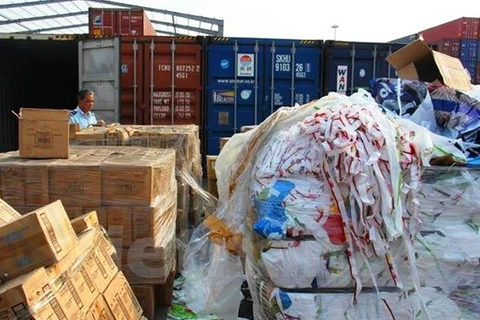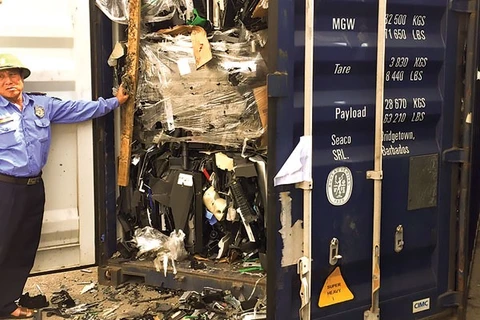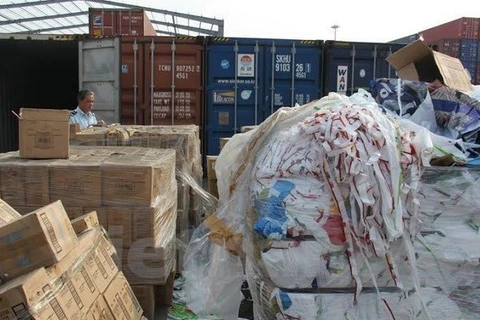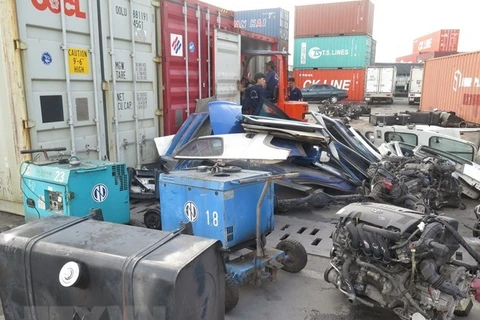 A police officer checks plastic waste imported by an enterprise in District 2 in HCM City. (Photo: VNA)
A police officer checks plastic waste imported by an enterprise in District 2 in HCM City. (Photo: VNA) Hanoi (VNS/VNA) - Many experts have raised concerns about the import of thousands of containers of plastic, and proposed raising fees for importing plastic waste to Vietnam and then using it as materials.
Hoang Van Thuc, Deputy Director of the Vietnam Environment Administration under the Ministry of Natural Resources and Environment (MONRE), said in the draft decree giving guidance to implement the Law on Environment Protection, the MONRE proposed adding regulations about plastic waste management.
One of them proposes that from the onset of 2025, Vietnam will allow enterprises to import plastic waste for materials for high value products only. Another new regulation is that enterprises can import 70 percent of their materials only, and the remaining 30 percent must be from domestic recycled plastic waste.
In the short term, to tighten management on plastic waste imports, Thuc said the MONRE proposed banning some of the plastic most harmful to the environment.
However, many enterprises prefer importing plastic waste instead of recycling domestic plastic.
A spokesman of the Vietnam Plastic Association (VPA) said in 2013-2017, Vietnam imported 91,400 tonnes of plastic waste per year, fourth out of the 10 ASEAN countries.
A recent study by Tuoi tre (Youth) newspaper showed domestic plastic waste was not separated at its source by families, so it was mixed with different waste, explaining why enterprises preferred to import plastic waste that has been separated.
The spokesman of the VPA also shared his fear that if enterprises did not use local materials, in the long term, the country’s plastic sector would lose its competitiveness and firms would be bought out by multinationals.
Professor Dang Kim Chi, an expert from the Vietnam Association for Conservation of Nature and Environment, said capping firms’ material imports at 70 percent was a good idea.
“If we do not implement the regulation, our country could become a place containing many kinds of waste from other countries,” she said.
Au Anh Tuan, Acting Director of the Customs Control and Supervision Department under the Vietnam General Department of Customs, said that at present, enterprises are allowed to import plastic waste only when they have valid certificates.
At present, nearly 10,000 containers containing plastic waste are lying in different ports across the country. Most of them are in the Hai Phong and Cat Lai ports, according to the Vietnam General Department of Customs.
The Law on Customs regulates that if no one receives import goods within three months, enterprises must re-export the goods.
To tackle plastic waste at ports, the Government has founded an inspection team led by the Ministry of Finance.
The VPA calculated that by 2023, the plastic sector will need about 10 million tonnes of plastic materials for domestic production and export. Vietnam can produce 2.6 million tonnes, the remaining 7.4 million tonnes needs to be imported.-VNS/VNA
VNA























